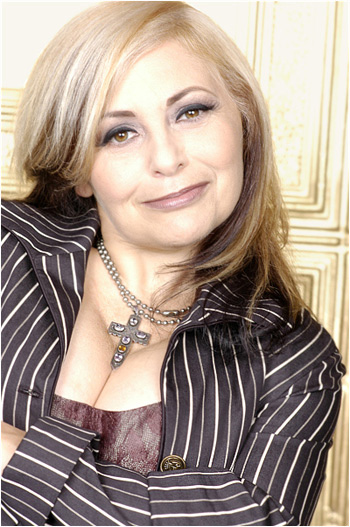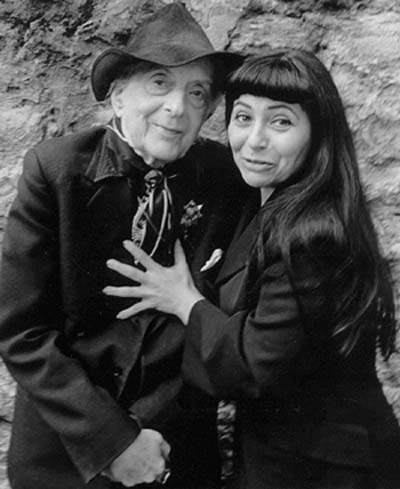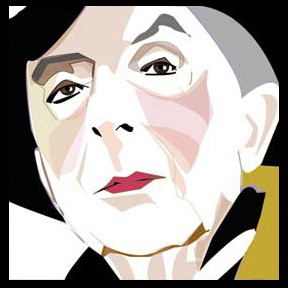|
A CENTENNIAL CELEBRATION! |
|
 |
THE QUENTIN CRISP ARCHIVES
PENNY ARCADE
Friend and performance artist
 Surely few have lived as unique a life as Quentin Crisp, nor as isolated. Quentin often compared himself to Joseph Carey Merrick, The Elephant Man. Merrick, who except for a brief turn in the rude side shows that were outlawed during his short life, was unemployable for most of his life because of his grotesque appearance. After years of public abuse due to the extreme deformity of his head, Merrick became a celebrity to the Victorian upper class and a favorite of Queen Victoria herself. Merrick died at age 27, only 18 years before Quentin's birth in 1908. In the oral culture of Edwardian England, before radio or television, Quentin would have known Merrick's life and with so few to compare his lot in life to, I can understand, why the young Denis Pratt, who later changed his name to Quentin Crisp, would have identified with the limitations his own much more benign but still provocative appearance brought him. Surely few have lived as unique a life as Quentin Crisp, nor as isolated. Quentin often compared himself to Joseph Carey Merrick, The Elephant Man. Merrick, who except for a brief turn in the rude side shows that were outlawed during his short life, was unemployable for most of his life because of his grotesque appearance. After years of public abuse due to the extreme deformity of his head, Merrick became a celebrity to the Victorian upper class and a favorite of Queen Victoria herself. Merrick died at age 27, only 18 years before Quentin's birth in 1908. In the oral culture of Edwardian England, before radio or television, Quentin would have known Merrick's life and with so few to compare his lot in life to, I can understand, why the young Denis Pratt, who later changed his name to Quentin Crisp, would have identified with the limitations his own much more benign but still provocative appearance brought him.Meeting Quentin in 1981 when he was 73 years of age and knowing him until his death a few weeks short of his 91st birthday, I saw no reason why he couldn't live to 100. He had a robustness of spirit one generally finds in Mediterranean goat herders. The long days of solitude that stretch into years, give an agility to body and mind and a twinkle in the eye, if the person is not driven half mad from human isolation. Quentin was not mad at all. Madness was a quality, which despite his eccentricity, was not part of his emotional or mental palette, although most who saw him in his early years of hennaed hair, rouged lips, and what was considered inappropriately flamboyant dress, would have found that hard to believe. In the early 70's, long before I met Quentin, I had known many goat herders when I lived on the island of Formentera, in Spain's Balearic Islands. That was before that lonely, ancient and rugged island became the playground for weekend Euro trash. In those days, Formentera was what it had been since eternity, a rock with Almond and Fig trees, Century Plants and few Pines, where an ancient people eked out a subsistence living in the face of harsh nature. Island people like mountain people have a fierce individuality, honed and bolstered by their isolation. Among this isolated people, every family had it's designated goat herder, who from childhood, spent years, in fact, their entire life in near total solitude. From dawn to dusk, they herded goats from one patch of scrub to another, rarely engaging in conversation with other human beings outside of an hour at a meager dinner in front of a kerosene lamp before falling into bed only to start the cycle before dawn the next day. Some of these herders, both men and women, were numbed into an animal like quietude but a few blazed with an intense individuality, forged by those long hours and long years spent alone. I recognized this very important element in Quentin from the first and he was quite pleased and comforted, if somewhat surprised by my innate understanding of this central reality of his life. In 1988, in response to a remark made to me by the columnist, Michael Musto, that I was the only person he had ever heard Quentin have a real conversation with, Quentin replied: "Most people are never with me. They are in my presence. Most people never talk to me." He continued, "They interview me." Hiding in plain sight for most of his adult life, Quentin Crisp was a figure of public, if anonymous, derision and speculation from his 20's well into his 60's, when through the sheer power of his individuality, he tore through the veil of anonymity to public recognition. In 1963, on the airwaves of British radio, he made his first contact with the general public, which began what he called his "path into the heart of humanity." That modest radio interview with Philip O'Connor led to the 1968 publication of his autobiography, The Naked Civil Servant, a book that sold poorly and made no impact. Then in 1975, with actor John Hurt as his "familiar", he burst in on a largely unsuspecting British public, where they were at their most vulnerable, in their sitting rooms, in their bathrobes having tea. The airing of that television film, based on his autobiography of the same title, directed by Jack Gold with screenplay by Philip Mackie, captured the complexity, wit and dignity with which Quentin Crisp traversed his life, and brought the discussion of homosexuality into public discourse in living rooms across Great Britain. Modestly demurring, that it was this presentation of his life that had brought about a change in the public opinion about homosexuality in Britain, Quentin would only give credit to Jack Gold, Philip Mackie and John Hurt. When pressed he would say, "Well, there were only two channels on British TV at that time so while they were making tea that night someone asked "Well what's on telly?" and the reply came back, "The news in on" "Well check the other channel", "Well, there is a homo talking about his life" "Well, then, lets watch the homo." In 1996 Quentin called me to ask for a dispensation from having to live to the age of 100, and instead be let off the hook at 90. He had publicly promised me to live to be 100 years old many times. I begged him to reconsider, reminding him of his promises. "You bullied me." he replied. "I said it to please you. You were being selfish." Certainly I was selfish, I overlooked his long list of ailments, much as he did, including the kind of ennui that comes as one nears 90, to all but the very few. I could not imagine the world without Quentin in it and when I told him so, remarking that 90 was a mere two years away he answered dryly, "I think I can eak it out." Ten days before he died in 1999, I commented that he might in fact die in Manchester, as a way of talking him out of going on that tortuous trip, and with his amused laughter egging me on, I built on the premise that he might actually die on the plane, causing his producer to not only lose the cost of bringing him to England but also depriving him of the income from Quentin's appearances. Quentin had a trickster's heart and an innate orneriness. He loved the idea of the producer, who had been making a pretty penny off him and underpaying him getting short shrift. Quentin laughed heartily, "That would be marvelous". However nothing would change the fact that he was set on dying as soon as possible. When I would chastise him for not taking his heart medicine he would only reply, "But taking my heart medicine is inconsistent with my desire to die." Later in the conversation on the day he left for Britain, I wailed into the phone "But what will I do when you die?" A moment passed in silence and he replied, "It is very simple Miss Arcade" he puttered on, seemingly unfazed by my sorrow, "I am going. You are staying. I feel sorry for you." An Edwardian dandy, he never completely lost the traces of the middle class that could not contain him no more than he could tolerate it's limits. Quentin Crisp saw most of a century with clear and open eyes from his birdseat at the edge of society. In 1995 I brought Quentin to meet Charles Henri Ford, the American Surrealist poet, born the year after him in 1909. We met for tea in Ford's attic rooms in The Dakota, the gothic apartment house at West 72nd St and Central Park West. They hated each other instantly in the most polite way possible. It was like Joan Crawford and Bette Davis in the beginning scenes of "Whatever Happened to Baby Jane" A favorite film of Quentin's that he suggested would make an excellent vehicle for the two of us a few weeks before he died. Charles, ever the rakish, boyish figure, who had ruled many worlds with only his talent and good looks, pronounced Quentin "A Fuddy Duddy" and " an old maid." Quentin for his part turned up his nose at Charles's blase spirit, calling him "Shallow, superficial and thoughtless." Yet it was just this superficiality that Ford and the coterie of modernists who flocked to Paris in the 20's and 30's were keen on developing. This was the original concept of modernism in the late 20's that eschewed deep feeling and ideas as such. When I admitted I could not understand Gertrude Stein's writing, Charles struck out at me, clearly exasperated, "Why do you need to understand? There is nothing to understand. It is the purity of language itself. Why do you need meaning? It is all on the surface." This idea of "surface", was something Ford passed on to Andy Warhol, who despite his self absorption, was a keen student of art history with a tremendous admiration of artistic lineage. Ford mentored Warhol for many years, acting as a living link between the 30's and the 60's. Quentin and Charles studiously ignored each other throughout the entire afternoon with impeccable manners on both their parts. Quentin, who had suffered ignominy for a great deal of his life, was disgruntled by Ford's blasé, breezy self-confidence, the mark of one who had it easy all his life. Ford was clearly frightened by Quentin's blatant embrace of old age, feeling Quentin had succumbed to old age, Ford's greatest enemy, and one to be fought to the death. Quentin embraced old age, and the wisdom it bestows. Yet Ford was wrong about Quentin succumbing to growing old. Both Charles and Quentin shared the true essence of youth which is an attribute that has nothing to do with age. Each approached everything that crossed their paths with the curiousity of 20 year olds yet each misread the other. Ford recoiled at Quentin's slightly moth eaten Edwardian dandiness, while Quentin was disdainful of Charles's faded blue jeans and latent hippie glamour. They were an anathema to one another, looking as though thru a fun house mirrror at each other's shadow selves, high priests of the same cult of individuality . Quentin viewed each period of his life as a stepping stone to self-awareness, something Ford assiduously avoided to the day he died .A few days before Ford's death at 92, I sat at his bedside, as Charles tapped his fingers together,cackling and sing songing, "Lucky! Lucky! Lucky! You can't say I haven't been lucky" gleefully and acutely aware that he had escaped much of the sorrow that life can bring. Quentin on the other hand had suffered deeply though stoically through out his life and had no room at all for people who could neither acknowledge or accept the lumps and bumps that life brings to oneself or others. In 1999, on September 26th, a few weeks before Quentin died, he and I did a final performance together at the Knitting Factory in New York City. Our last performance together fell oddly on the anniversary of our first public performance on the same date in 1992. Before an admiring crowd, I asked Quentin to comment on aging and he replied, "When you are in your 80's your body just starts to hang on you." I adored stating openly that Quentin would die soon as the resulting shock and annoyance towards me from other people delighted Quentin so much. "They are very angry with me Quentin because I said that you are very old and soon you will die" "But why should that annoy them?" he asked, turning right and left in his chair and scanning the audience, "It is true." "Because they spend hours at the gym, Quentin, and they think that they will never grow old and that they will never die." In the hush that followed , Quentin pulled himself up in his chair, made eye contact around the room and said disdainfully "I see. How foolish they are." Just as The Elephant Man, whose mind was fully functional, but whose appearance greatly limited his options in life, Quentin was bowed by this circumstance until late in life when the tides of time turned and Quentin was able to fully embrace the societal freedom that had long eluded him. "Not to worry Miss Arcade," Quentin cautioned me time and time again, when my motives and point of view were misinterpreted by the world around me, "Time is kind to the non-conformist." I think few of us are able to understand what it meant to a man shunned by society for most of his life to be able to walk without drawing a crowd of gawkers or worse, and to be able to freely converse with those he met along his path. If it were not for his health I think Quentin would have stayed on to reach his centennial, as there was nothing wrong with his mind. Quentin was not a sensualist, he ate heartily when he was hungry, and nothing when he was not, and largely ignored the needs of his body. He bathed like a cat, only when necessary and despite his body crying in pain, he did little to alleviate his physical discomforts, from ingrown toenails, to hernias, and later prostate cancer and congestive heart failure. Quentin lived in his mind and he lived for the pursuits of the mind. There was no better companion of any age than Quentin when it came to reading a scene, an event or an individual. He was quick, direct and honest as long as it was not in public and would cause none discomfort. Quentin was intellectually perverse. A contrary like certain American Indians who live their lives doing everything backwards. A natural provocateur, he enjoyed getting everyone in a lather and then benignly looking around in mock surprise at the results. I believe the rejection and isolation that his appearance caused him in the early part of his life, coupled with the fact that it doomed him in many ways to a very narrow and intellectually stifling and ultimately unfulfilling mileure,was something he never fully recovered from. Those insults came not only from the straight society of his day but also from the closeted gay one. This spurred his desire to be at the center of humanity and not restricted to a gay ghetto. I think he would have been shocked, truly shocked by 9/11 because he was America's greatest supporter. He was a true believer in the American Way. This curious adulation was one of the very few things he was naive about and it was at the center of many quarrels between us. While he hated grandiosity in people he adored it in America, which was like a person to him, not just a country. From his vantage point of long years of observation from the sidelines of life, he was largely an unerring reader of the mores and foibles of humanity and society at large yet he saw America as 'a good parent, trying to stem the quarrels of unruly children around the world. He died just before the world changed for good but he had seen it coming, the loss of a way of life that had been filled with structure, both good and bad. I wonder what he would have made of Enron and the Iraq War, and the fall of the dollar. I think the chaos would have been unbearable for him. While he had suffered much, beneath his acceptance and humaneness, he had never forgiven a second of it, the chaos that he saw coming in society, once finalized and made concrete would have made him sad and as someone who had no room for sorrow in life, even his own, I believe it would have been untenable for him. Like most of us, Quentin didn't have a fallback position regarding the end of western civilization.  Quentin hated the encroaching gentrification of his neighborhood in 1999 and what it has become now would have infuriated him and he had spent long years removing fury from his emotional menu. Part of his glee in life was to accept the horror of every day life but nothing would have prepared him for the real death knell of society. He adored that there was greed, and injustice and corruption in both people and in the world but he liked a cozy kind of greed, injustice and corruption. The kind that exists in fairy tales and dime store novels. I believe that the ogre of modern free market capitalism, with it's outsourcing, homogenization and flagrant thievery at the highest levels of commerce and the government would have shocked him into a position he had spent his life escaping. Caring. Caring would have been a terrible position for Quentin who believed as humans we deserve nothing. Quentin believed neither in charity nor kindness for kindness sake except for the most surface kind of polite societal courtesy. It was this detachment that made him accept everyone and everything that came into his life equally. He for the most part suspended judgment yet In a strange way he held on to the middle class mores that he was raised with. His life was one boundaried by limited expectations of what people or the world could offer him and with a mind as great as his, his own understanding of the strictures placed on his development by society left him little sympathy for the strictures of others. He offered instead his own life as a kind of path that leads to what he considered the most valuable treasure of all, personal authenticity.
Quentin hated the encroaching gentrification of his neighborhood in 1999 and what it has become now would have infuriated him and he had spent long years removing fury from his emotional menu. Part of his glee in life was to accept the horror of every day life but nothing would have prepared him for the real death knell of society. He adored that there was greed, and injustice and corruption in both people and in the world but he liked a cozy kind of greed, injustice and corruption. The kind that exists in fairy tales and dime store novels. I believe that the ogre of modern free market capitalism, with it's outsourcing, homogenization and flagrant thievery at the highest levels of commerce and the government would have shocked him into a position he had spent his life escaping. Caring. Caring would have been a terrible position for Quentin who believed as humans we deserve nothing. Quentin believed neither in charity nor kindness for kindness sake except for the most surface kind of polite societal courtesy. It was this detachment that made him accept everyone and everything that came into his life equally. He for the most part suspended judgment yet In a strange way he held on to the middle class mores that he was raised with. His life was one boundaried by limited expectations of what people or the world could offer him and with a mind as great as his, his own understanding of the strictures placed on his development by society left him little sympathy for the strictures of others. He offered instead his own life as a kind of path that leads to what he considered the most valuable treasure of all, personal authenticity. |
|
Read what Penny Arcade wrote for the tribute booklet An Evening for Quentin Crisp: The Memorial. < |
Photograph copyright © by Lina Pallotta. All rights reserved.

Site Copyright © 1999–2009 by the Quentin Crisp Archives.
All rights reserved.

